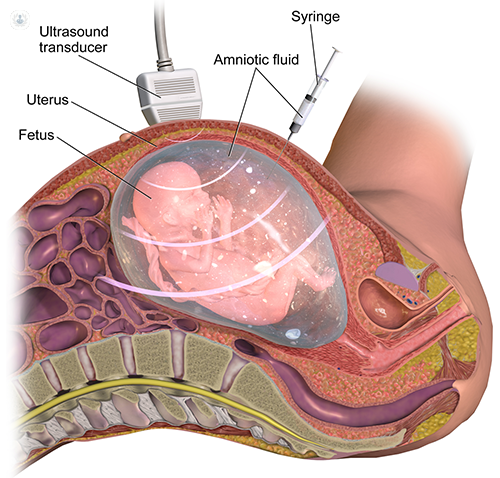

What is amniocentesis?
Amniocentesis is a test sometimes performed during pregnancy to check for genetic or chromosomal conditions in the baby. To do so, a sample of the amniotic fluid is taken. This is the fluid that surrounds the unborn baby in the uterus. This test can test for Down’s syndrome, for example.

What does amniocentesis consist of?
Amniocentesis is performed between the 15th and 20th week of pregnancy. A thin needle is inserted through the abdominal wall, using an ultrasound to guide this. The needle is inserted into the amniotic sac and a small sample of the amniotic fluid is taken for analysis in a laboratory. The test only takes 10 minutes. After the test it is normal to have some cramps that are similar to menstrual cramps and light spotting for a couple of days. It is advised to avoid any strenuous activity for a few days after the test.
Why is amniocentesis done?
Amniocentesis is usually recommended for women at risk of having a child with congenital anomalies due to a family history with genetic disorders. Amniocentesis is offered if:
- You are aged over 35 years
- You have a family history of inherited disorders
- An antenatal screening has indicated a possible problem
Preparation for amniocentesis:
No special preparation is required before amniocentesis and you may eat and drink normally before the test. Some doctors will advise not going to the toilet before the test as a fuller bladder can make the test easier.
How does it feel during amniocentesis?
It is not a painful test, in fact it is usually performed without anaesthesia, however, local anaesthetic may be injected if preferred. The only pain is the needle prick, and the rest of the test should not be painful, but some women experience an uncomfortable sensation during the test.
Risks of amniocentesis:
Before you have amniocentesis you will be informed about potential risks and associated complications. These are the possible risks:
- Miscarriage – the risk of having a miscarriage is between 0.5-1% if the test is done after 15 weeks of pregnancy and this risk if higher if the test is done before the 15th week.
- Infection – as with any surgical procedure, there is a small risk of infection, but this is 1 in 1000 for amniocentesis.
- Injury from the needle – there is a possibility that the needle could puncture the placenta, but this will usually heal itself.
- Club foot – having amniocentesis before 15 weeks of pregnancy has been linked to higher incidence of club foot in babies.
- Rhesus disease – if your blood type is rhesus negative and your baby’s is rhesus positive, sensitisation can occur in amniocentesis. This is when a bit of your baby’s blood enters your own bloodstream and, as a result, your body produced antibodies to attack it. Untreated, this can lead to your baby developing rhesus disease.
Meaning of abnormal results:
You would normally receive the results within a few days of having the test. Abnormal results may indicate that the baby has a genetic or chromosomal problem, such as Down’s syndrome, or congenital anomalies that compromise the baby's spine or brain. Most results for amniocentesis are normal, meaning no problems were found with the baby. However, amniocentesis only tests for certain problems, so the test cannot determine if your baby is completely healthy. If the results indicate a genetic condition of deformity, you can talk to a specialist about the implications of this finding. You may have to decide whether to proceed with the pregnancy or have a termination. This is a difficult decision that you will receive advice and information on from a healthcare professional.
